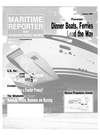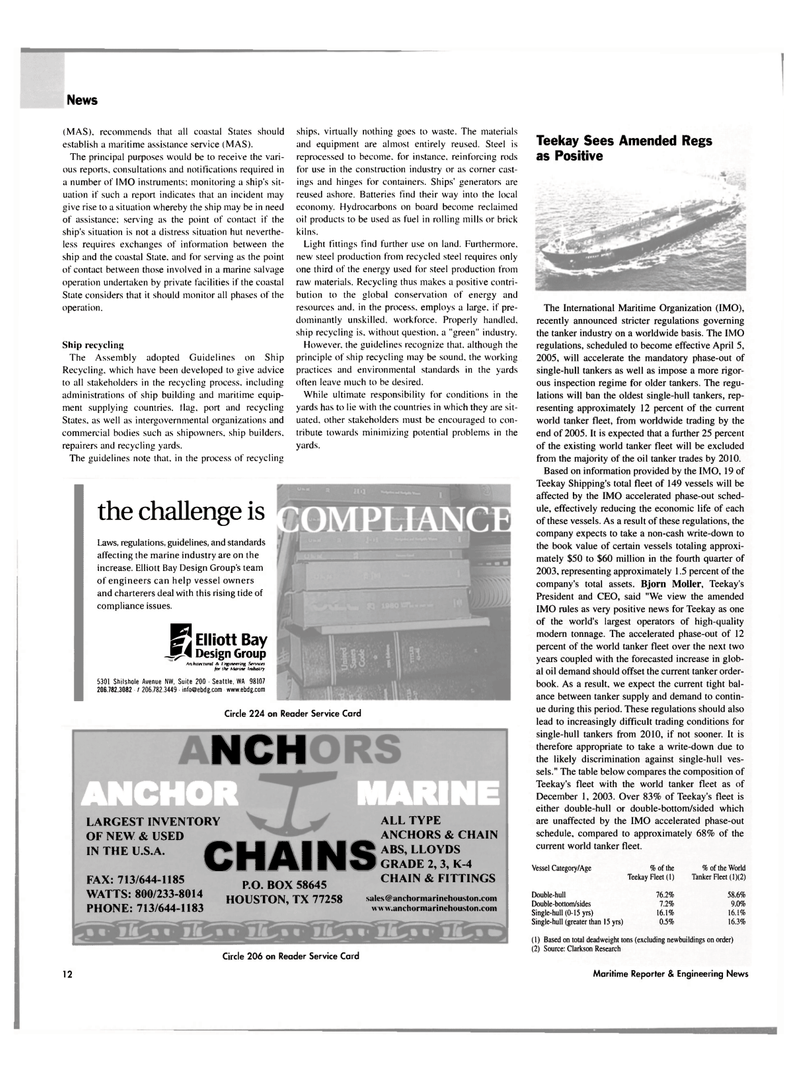
Page 12: of Maritime Reporter Magazine (January 2004)
Ferry & Passenger Vessel Yearbook
Read this page in Pdf, Flash or Html5 edition of January 2004 Maritime Reporter Magazine
News (MAS), recommends that all coastal States should establish a maritime assistance service (MAS).
The principal purposes would be to receive the vari- ous reports, consultations and notifications required in a number of 1MO instruments; monitoring a ship's sit- uation if such a report indicates that an incident may give rise to a situation whereby the ship may be in need of assistance: serving as the point of contact if the ship's situation is not a distress situation hut neverthe- less requires exchanges of information between the ship and the coastal State, and for serving as the point of contact between those involved in a marine salvage operation undertaken by private facilities if the coastal
State considers that it should monitor all phases of the operation.
Ship recycling
The Assembly adopted Guidelines on Ship
Recycling, which have been developed to give advice to all stakeholders in the recycling process, including administrations of ship building and maritime equip- ment supplying countries, flag, port and recycling
States, as well as intergovernmental organizations and commercial bodies such as shipowners, ship builders, repairers and recycling yards.
The guidelines note that, in the process of recycling the challenge is
Laws, regulations, guidelines, and standards affecting the marine industry are on the increase. Elliott Bay Design Group's team of engineers can help vessel owners and charterers deal with this rising tide of compliance issues. ships, virtually nothing goes to waste. The materials and equipment are almost entirely reused. Steel is reprocessed to become, for instance, reinforcing rods for use in the construction industry or as corner cast- ings and hinges for containers. Ships' generators are reused ashore. Batteries find their way into the local economy. Hydrocarbons on board become reclaimed oil products to be used as fuel in rolling mills or brick kilns.
Light fittings find further use on land. Furthermore, new steel production from recycled steel requires only one third of the energy used for steel production from raw materials. Recycling thus makes a positive contri- bution to the global conservation of energy and resources and. in the process, employs a large, if pre- dominantly unskilled, workforce. Properly handled, ship recycling is, without question, a "green" industry.
However, the guidelines recognize that, although the principle of ship recycling may be sound, the working practices and environmental standards in the yards often leave much to be desired.
While ultimate responsibility for conditions in the yards has to lie with the countries in which they are sit- uated. other stakeholders must be encouraged to con- tribute towards minimizing potential problems in the yards.
W\ Elliott Bay jjM Design Group
Architectural & Engineering Services for (he Marine Industry 5301 Shilshole Avenue NW, Suite 200 • Seattle. WA 98107 206.782.3082 / 206.782.3449 [email protected] www.ebdg.com
Circle 224 on Reader Service Card
NCH
ANCHOR
LARGEST INVENTORY
OF NEW & USED
IN THE U.S.A.
MARINE
CHAINS
FAX: 713/644-1185
WATTS: 800/233-8014
PHONE: 713/644-1183
P.O. BOX 58645
HOUSTON, TX 77258
ALL TYPE
ANCHORS & CHAIN
ABS, LLOYDS
GRADE 2, 3, K-4
CHAIN & FITTINGS sales @ anchormarinehouston.com www.anchormarinehouston.com
Teekay Sees Amended Regs as Positive
The International Maritime Organization (IMO), recently announced stricter regulations governing the tanker industry on a worldwide basis. The IMO regulations, scheduled to become effective April 5, 2005, will accelerate the mandatory phase-out of single-hull tankers as well as impose a more rigor- ous inspection regime for older tankers. The regu- lations will ban the oldest single-hull tankers, rep- resenting approximately 12 percent of the current world tanker fleet, from worldwide trading by the end of 2005. It is expected that a further 25 percent of the existing world tanker fleet will be excluded from the majority of the oil tanker trades by 2010.
Based on information provided by the IMO, 19 of
Teekay Shipping's total fleet of 149 vessels will be affected by the IMO accelerated phase-out sched- ule, effectively reducing the economic life of each of these vessels. As a result of these regulations, the company expects to take a non-cash write-down to the book value of certain vessels totaling approxi- mately $50 to $60 million in the fourth quarter of 2003, representing approximately 1.5 percent of the company's total assets. Bjorn Moller, Teekay's
President and CEO, said "We view the amended
IMO rules as very positive news for Teekay as one of the world's largest operators of high-quality modern tonnage. The accelerated phase-out of 12 percent of the world tanker fleet over the next two years coupled with the forecasted increase in glob- al oil demand should offset the current tanker order- book. As a result, we expect the current tight bal- ance between tanker supply and demand to contin- ue during this period. These regulations should also lead to increasingly difficult trading conditions for single-hull tankers from 2010, if not sooner. It is therefore appropriate to take a write-down due to the likely discrimination against single-hull ves- sels." The table below compares the composition of
Teekay's fleet with the world tanker fleet as of
December 1, 2003. Over 83% of Teekay's fleet is either double-hull or double-bottom/sided which are unaffected by the IMO accelerated phase-out schedule, compared to approximately 68% of the current world tanker fleet.
Vessel Category/Age
Double-hull
Double-bottom/sides
Single-hull (0-15 yrs)
Single-hull (greater than 15 yrs) % of the
Teekay Fleet (1) 76.2% 7.2% 16.1% 0.5% % of the World
Tanker Fleet (1)(2) 58.6% 9.0% 16.1% 16.3%
Circle 206 on Reader Service Card (1) Based on total deadweight tons (excluding newbuildings on order) (2) Source: Clarkson Research 12 Maritime Reporter & Engineering News

 11
11

 13
13
